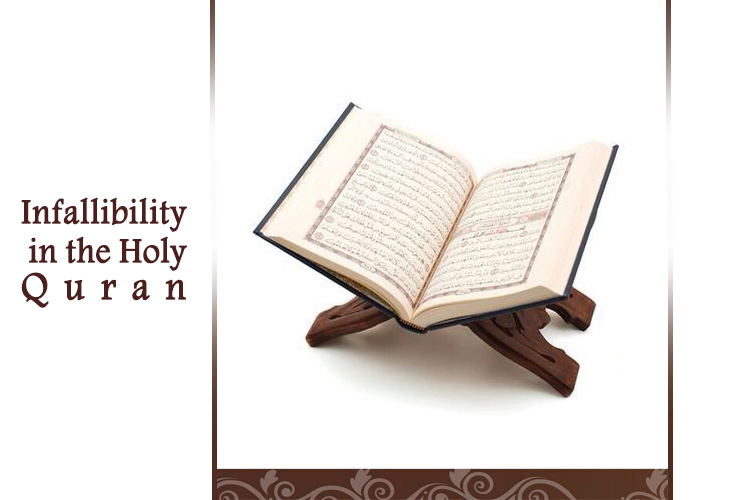One of the holy verses of the Quran has referred to infallibility and showed its characteristics in different forms. In some verses it was mentioned as a general law, but in other verses was mentioned through talking about the infallibility of some prophets (pbuh) themselves, without the interference of angels.
In the same form He almighty says:” He (satan) said:” I swear by Your Might, that I will seduce all of them”. 1
And saying:” He said, “My Lord, since You have lured me away, I will glamorize for them on earth, and I will lure them all away, Except for Your chosen servants among them, He said, “This is a straight path, binding on Me, Over My worshipers, you have no authority, except for the deviants who follow you”. 2
We benefit from these holy verses and from what resembles them that Iblis (devil) is the reason for making a sin, and being seduced or misled. He’s who whispers for some people, beautifies and endears sins for them. But he’s not able to affect all of the people because a part of them is sincere, those whom God describes as “my worshipers that he (Iblis) has no authority on”. He cannot seduce and affect them, and this is what “infallibility” means.
It is not implicit that describing them as “God’s almighty worshipers” is an honor for them because this means that they put off any form of servitude other than for God almighty, so no one can affect them except Him.
He almighty also says:” And remember that Ibrahim was tested by his God with certain commands, which he fulfilled: He said: "I will make thee an Imam to the Nations." He pleaded: "And also (Imams) from my offspring!" He answered: "But My Promise is not within the reach of evil-doers."3
Oppression is taken from darkness, which is the opposite of light, and it has many proofs such as oppressing oneself and others in different levels that were mentioned in many holy verses such as:” Polytheism (joining others in worship with God) is a great Zulm (darkness-wrong) indeed.4
And saying:” My God, I have wronged myself, so forgive me.” So He forgave him. He is the Forgiving, the Merciful”. 5
And saying:” That is the right religion. Therefore, do not mistake yourselves for them”. 6
And saying:” He (David) replied: 'He has without doubt wronged you in seeking to add your ewe to his sheep”. 7
One of the proofs of oppression is being away from the light of guidance and being close to commiting sins. God’s almighty saying: "But My Promise is not within the reach of evil-doers” includes all the levels and proofs of oppression where the reason is that those who are misfortuned in one of the forms of oppression will not be within God’s almighty promise, which is prophecy and Imamate.
On the other hand, many verses were mentioned when he talks about the infallibility of some prophets specifically, such as:” Nor does he speak out of his own desire, Indeed it is not except a Revelation which is revealed”. 8
These two verses clearly show that whatever the prophet (pbuh) says, is revealed from God almighty and doesn’t include any mistake or inattention. That’s why it is a duty to follow him (the prophet) as God’s almighty says:” He who obeys the Messenger thereby obeys God; as for he who turns away, We have not sent you as a keeper over them!”. 9
It is impossible for him (the prophet) to mistake or commit sins, and despite that God said that whoever obeys him has obeyed God.
God almighty says:” Whatever the Messenger gives you, follow it; and whatever he forbids you, abstain. And fear God; surely, God is Stern in retribution”. 10
This verse has linked God’s punishment with the disobedience of his messenger. Therefore, if the prophet isn’t sinless, then there’s no meaning for this link; same as that it wasn’t logical or true to follow whatever the messenger gives him and abstain from what he forbade him from.
Also, God says:” God intends to remove all impurity from you, O the Prophet's family , and to purify you thoroughly”. 11
The aim of this holy verse is to say that God almighty wants to purify them from any kind of impurity, so they are sincere to Him almighty.
We can conclude this aim from looking at the many synonyms of the word “impurity” where it can mean: Dirtiness, impurity, doubt, punishment, and every ugly and filthy deed. 12
It is not hidden that the divine will is a legislative will not a formative will which means that they are not obliged not to do that, but that will surely happen because the divine will is based here on purifying them from impurity; He almighty didn’t say that he wants to forbade him from the impurities, but the verse’s meaning is that they have chosen to be away of every impurity as if not seeing them and never being existed in their lives. Therefore, the divine will was accomplished by making them away from impurities because they decided to be away from.
The verses that refer to the Prophet’s infallibility are many in the holy Quran.
His Eminence Al Shaikh Hatem Isma’il
1] Surah Sad, Verse: 82-83.
[2] Surah Al-Hijr, verse: 39-42.
[3] Surah Al-Baqarah, verse: 124.
[4] Surah Luqman, verse: 13.
[5] Surah Al-Qasas, Verse: 16.
[6] Surah At-Tawbah, verse: 36.
[7] Surah S, Verse: 240.
[8] Surah An-Najm, verse: 3-4.
[9] Surah An-Nisa, verse 80.
[10] Surah Al-Hashr, verse: 7.
[11] Surah Al-Ahzab, Verse: 33
[12] Lisan al-Arab (The Tongue of Arabs), Ibn Manzur, vol. 5, p. 146, article of impurity.



















